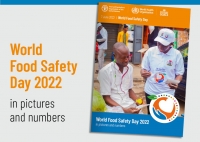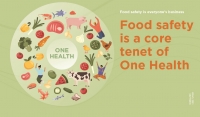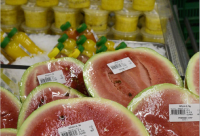News

21/11/2022
Growing interest in healthy diets has led to demand for the year-round availability of fresh fruits and vegetables and need for all actors in the food supply continuum, including in greenhouses, to be aware of the vulnerability of fresh produce to various food safety hazards (biological, chemical and physical).
As part of the project “Smart Farming for Future Generation", funded by the Republic of Korea, FAO provides support to strengthen food safety in greenhouses operations in Viet Nam. In this context, FAO Food Safety Officer Eleonora Dupouy has undertaken a technical backstopping mission in the last week of September 2022 to...

18/11/2022
FAO Farmer Field Schools (FFS) have demonstrated that making changes in livestock production practices can lead to prudent antimicrobial use (AMU), and safe food as well as increased profit margins. Results from pilots in Ghana, Kenya, Zambia, and Zimbabwe show that farmers who participated in FAO’s poultry FFS decreased their use of antimicrobials on the farm and increased their efforts in infection prevention and control. The increased use of biosecurity measures, such as footbaths and personal protective equipment, were a result of improved knowledge, more prudent attitudes and practises on AMU. Increased motivation and interaction with animal health professionals were...

16/11/2022
FAO, with the kind financial support of the Government of France, is currently convening a regional workshop on food safety risk assessment of residues of veterinary drugs in food in Santiago, Chile on 15 - 17 November 2022. The workshop is the result of close collaboration between the FAO Food Systems and Food Safety Division and the FAO Regional Office for Latin America and the Caribbean.
This subject is of great importance for the region, as countries in this area are key producers and exporters of meat. In this regard, FAO’s Food Safety Officer, Vittorio Fattori, pointed out that “it is...

16/11/2022
FAO hosted the Joint FAO/WHO expert meeting on microbiological risk assessment (JEMRA) of Listeria monocytogenes in foods this October in Rome. “It was such a pleasure to have the JEMRA back with in-person meetings again in the meeting room we used to convene the meeting. The experts could overcome the challenges of meeting in different time zones and sit together to discuss the topic fully with great focus and efficiency,” said Kang Zhou, Food Safety Officer from FAO.
FAO and WHO recognize the seriousness of Listeria infections, particularly for those most at risk. In 2004, JEMRA experts delivered a risk assessment...

11/11/2022
Markus Lipp, FAO Senior Food Safety Officer, spoke at the opening of the 16th Dubai International Food Safety Conference at the Dubai World Trade Center on 1 November. The three-day conference focused on strategic ways to maintain food safety and food security, including through the use of innovations and technologies to strengthen the supply chain. More than 3 000 international experts representing international organizations, national institutions and private sector entities, were in attendance.
Here is what he said:
Excellencies, Ministers, Ambassadors, Ladies and Gentlemen, good morning and good day to all of you.
My sincere thanks to Her Excellency Mariam bint Mohammed Saeed Hareb...

04/11/2022
A group of 24 experts from 15 countries identified the food safety hazards associated with cell-based foods while gathered in the Republic of Singapore on 1-4 November 2022. The experts – who have gained knowledge of cell-based food in the public and private sectors, academia, research and non-government organizations - discussed the potential food safety issues in a 3.5-day meeting convened by the Food and Agriculture Organization of the United Nations (FAO), in collaboration with the World Health Organization (WHO).
The experts found that with cell-based food, we run the same risks as with conventionally produced food: the occurrence...

26/10/2022
The report on the observance of World Food Safety Day 2022 has now been released in all six official UN languages with the title “World Food Safety Day 2022 in pictures and numbers”, offering an overview of this year’s events. Observances were held in at least 109 countries for the fourth annual World Food Safety Day.
Events included webinars and conferences and a wide variety of awareness-raising activities such as quizzes, tasting sessions with food safety tips, sports events and oratory competitions, as well as food safety surveys and media presentations. Notably, there were many school activities organized in different parts...

19/10/2022
The Food and Agriculture Organization of the United Nations (FAO), in collaboration with the World Health Organization (WHO), organized an online meeting entitled “Food safety and cell-based food: why terminology matters?” on 6 October 2022, as a pre-session to the upcoming expert on cell-based food that will take place in Singapore on 1-4 November 2022.
Dr Mark Sturme from Wageningen Food Safety Research, Wageningen University and Research, the Netherlands, presented the paper entitled “Food safety aspects of cell-based food - Background document one: Terminologies” which he authored together with Dr Gijs Kleter from the same institution. Also, Dr William...

18/10/2022
Four international organizations have formulated an action plan to sustainably balance and optimize the health of humans, animals, plants and ecosystems – which includes strengthening food safety as one of the six interdependent action tracks. On 17 October 2022, FAO, together with the United Nations Environment Programme (UNEP), the World Organisation for Animal Health (WOAH, founded as OIE) and the World Health Organization (WHO) launched the One Health Joint Plan of Action (2022–2026).
The document will help guide the four organizations, or ‘Quadripartite’, in promoting a collaborative approach, involving various sectors, disciplines and communities worldwide to better prevent, predict, detect and...

17/10/2022
A new FAO publication looks into this question. The document, titled Microplastics in food commodities – A food safety review on human exposure through dietary sources, outlines the existing literature on the occurrence of microplastics and their associated contaminants in foods. It also estimates the dietary exposure of consumers to these materials; highlights some knowledge gaps with respect to their relevance to public health; and offers some recommendations for future work on microplastic particles to support food safety governance.
Micro- and nanoplastics have been detected in fishery products and other food commodities, raising concerns about their impact on human health....
Stay up to date and connect to our RSS feed!
